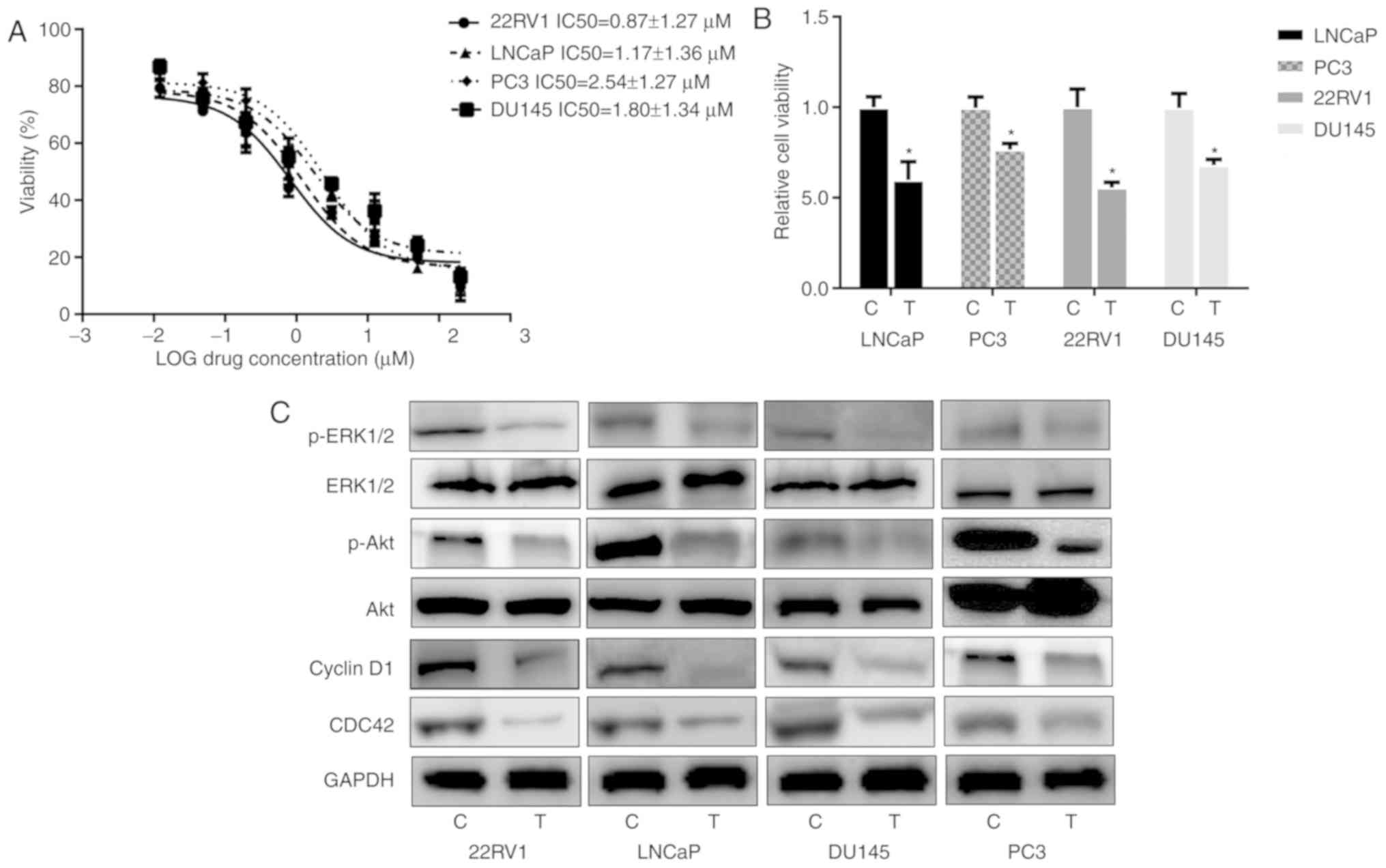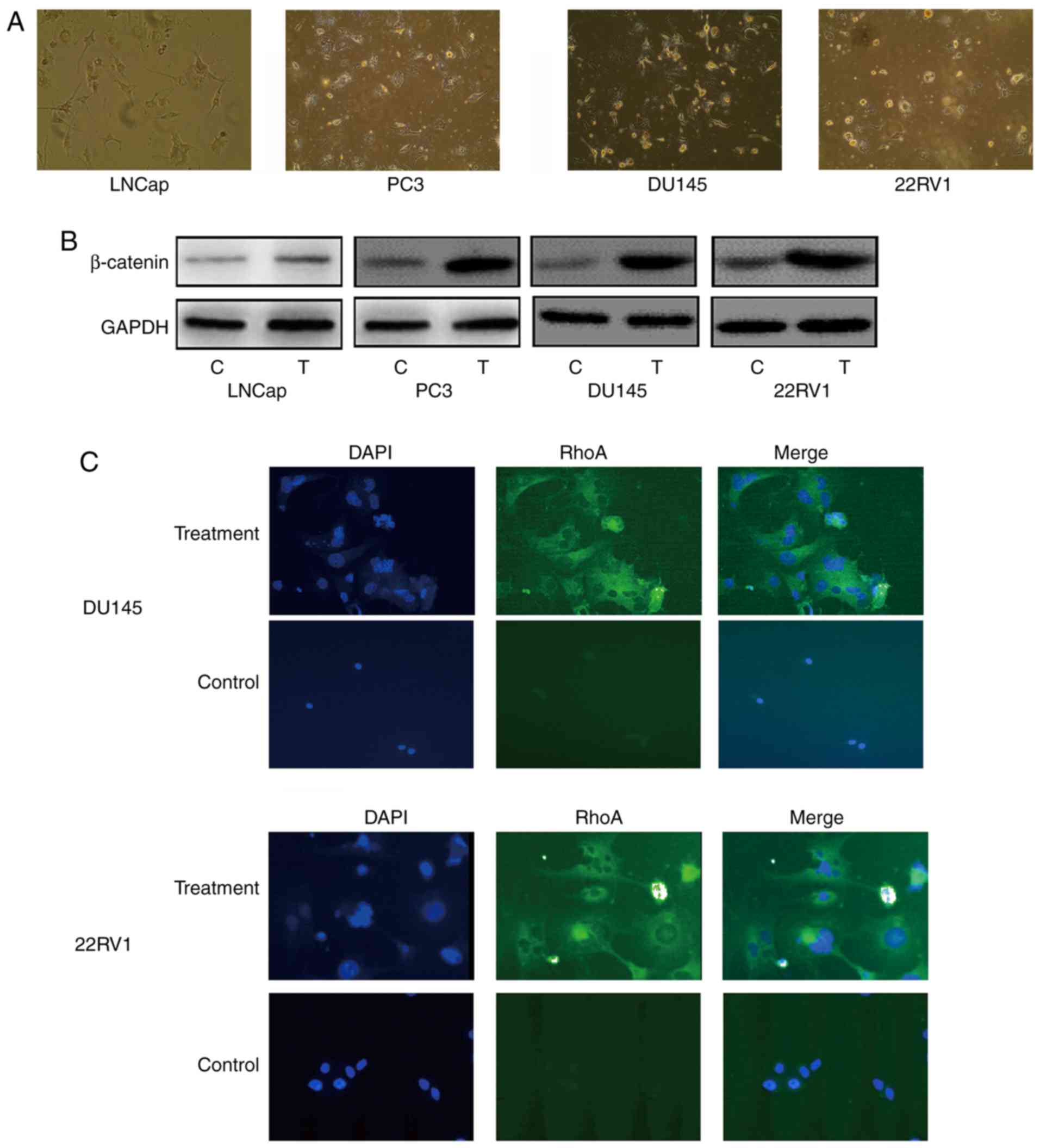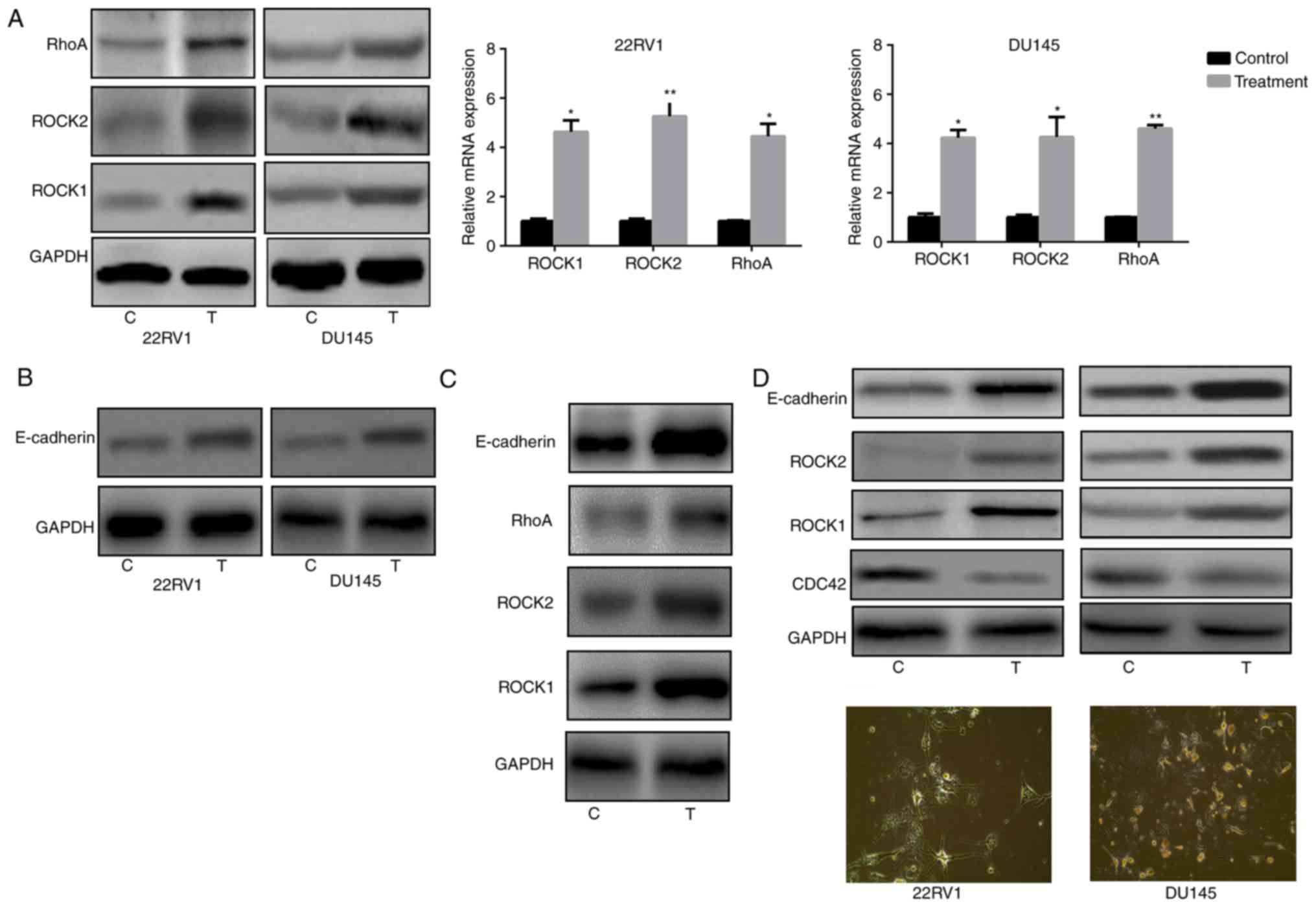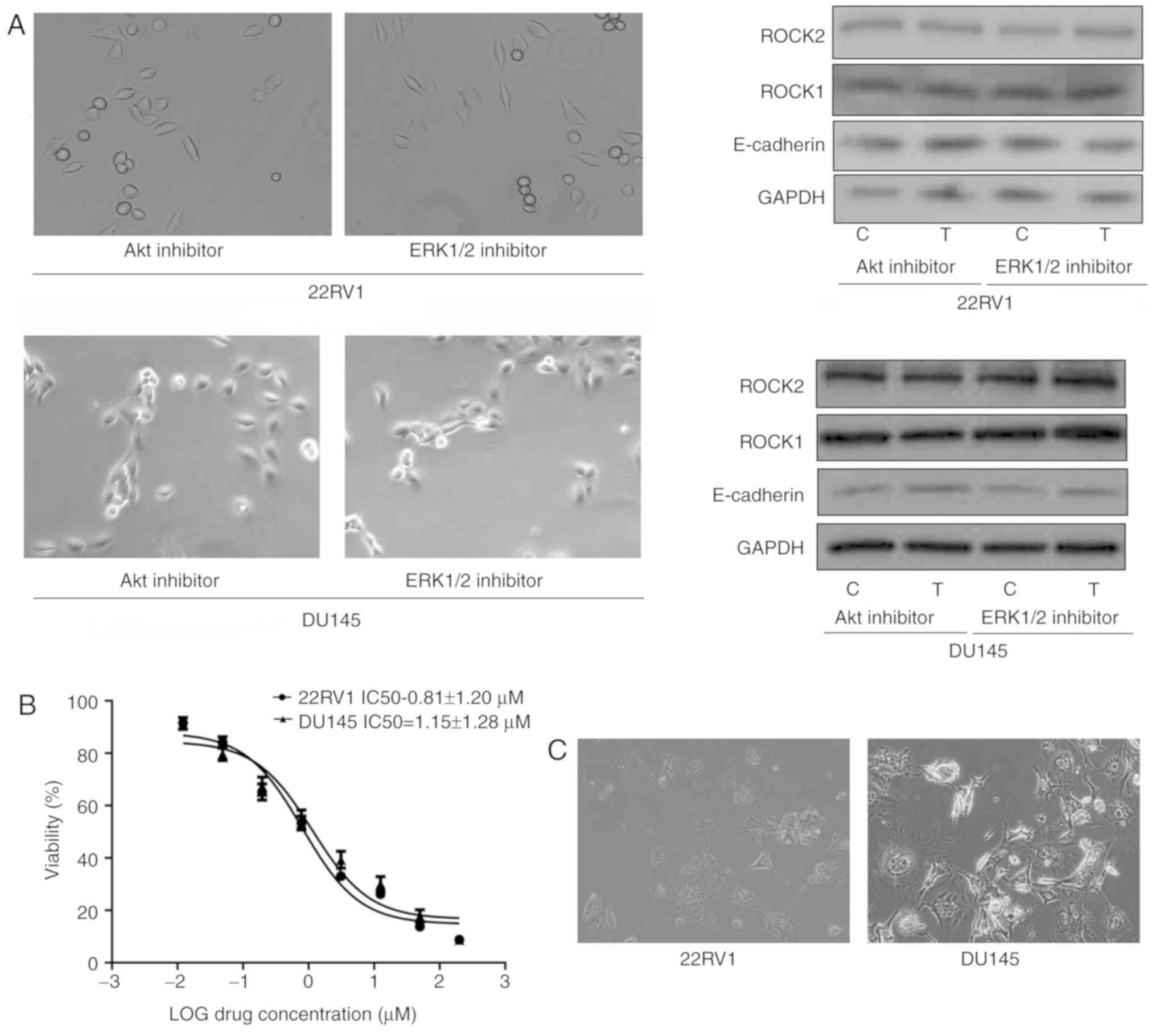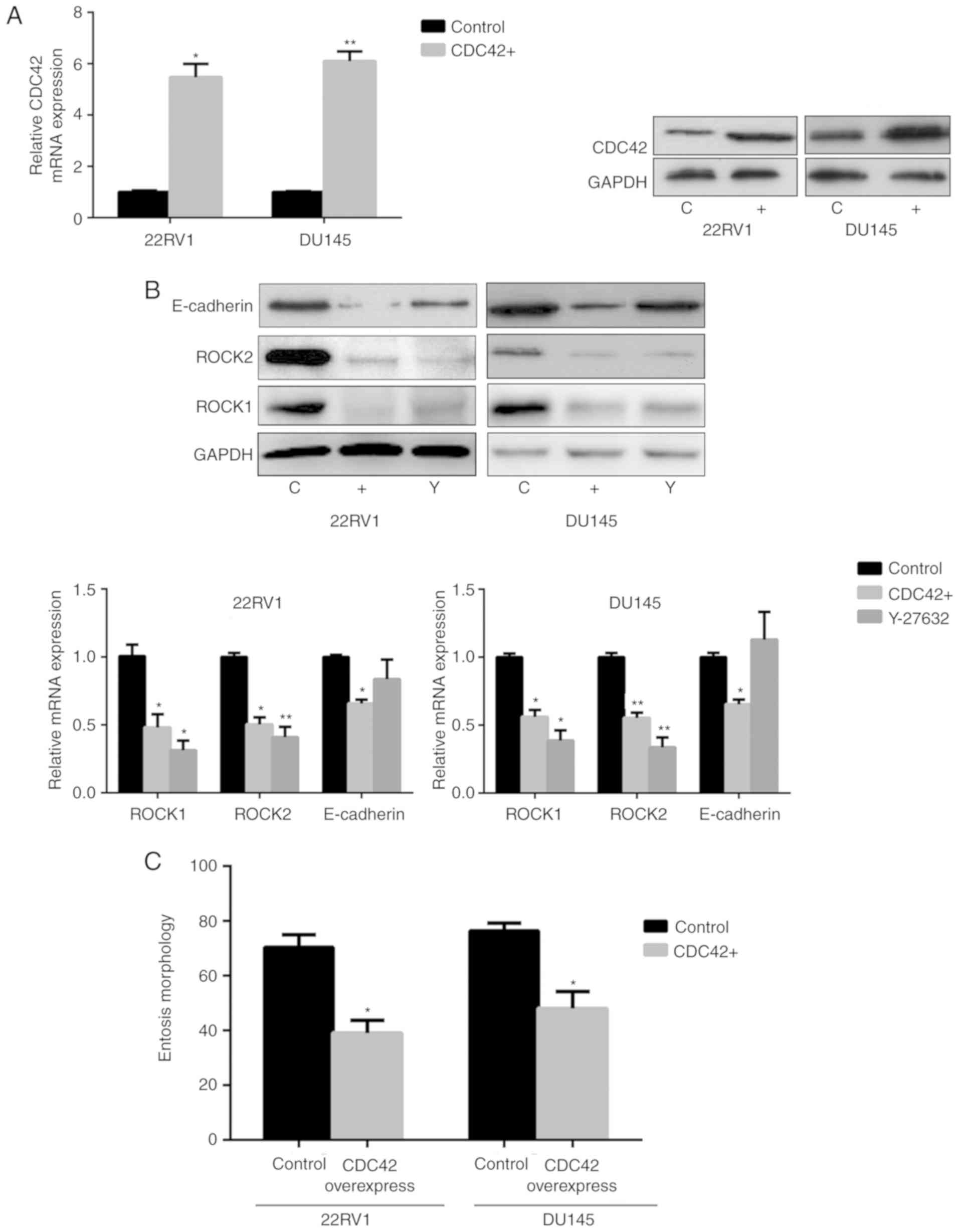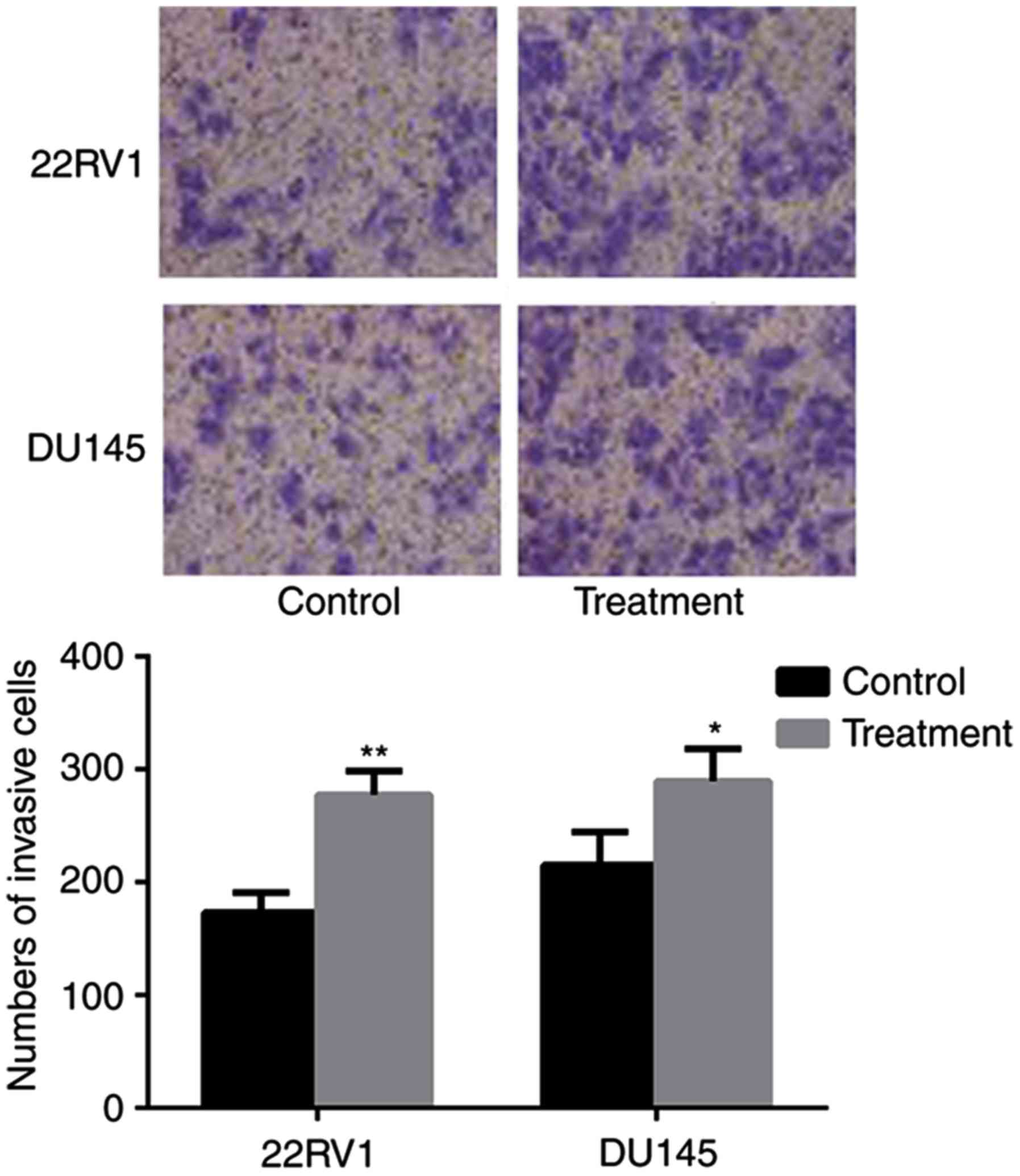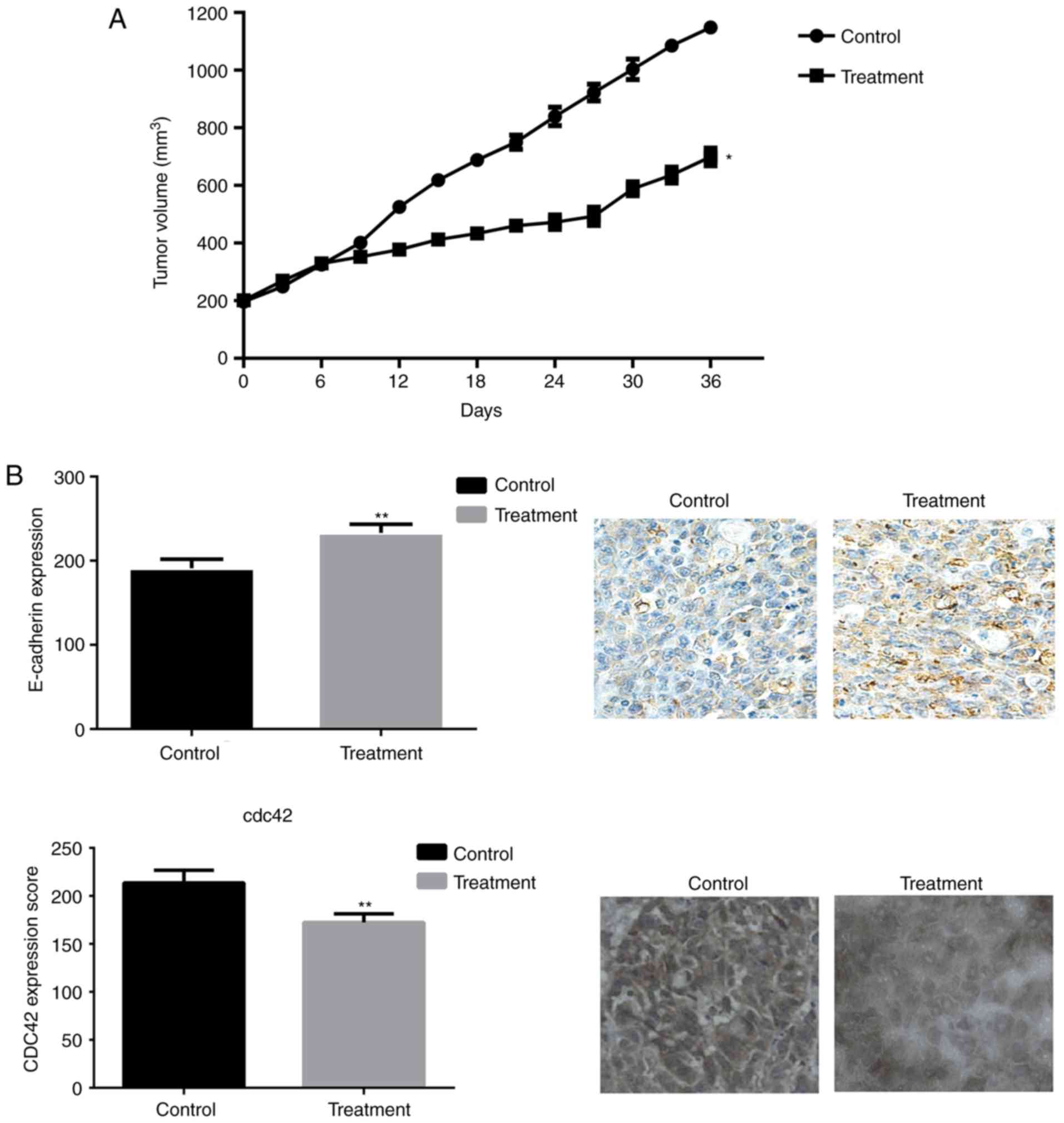|
1
|
Miller KD, Siegel RL, Lin CC, Mariotto AB,
Kramer JL, Rowland JH, Stein KD, Alteri R and Jemal A: Cancer
treatment and survivorship statistics, 2016. CA Cancer J Clin.
66:271–289. 2016. View Article : Google Scholar : PubMed/NCBI
|
|
2
|
Madan RA, Gulley JL, Schlom J, Steinberg
SM, Liewehr DJ, Dahut WL and Arlen PM: Analysis of overall survival
in patients with nonmetastatic castration-resistant prostate cancer
treated with vaccine, nilutamide, and combination therapy. Clin
Cancer Res. 14:4526–4531. 2008. View Article : Google Scholar : PubMed/NCBI
|
|
3
|
Hait WN and Hambley TW: Targeted cancer
therapeutics. Cancer Res. 69:1263–1267. 2009. View Article : Google Scholar : PubMed/NCBI
|
|
4
|
Schlessinger J: Cell signaling by receptor
tyrosine kinases. Cell. 103:211–225. 2000. View Article : Google Scholar : PubMed/NCBI
|
|
5
|
Prenzel N, Fischer OM, Streit S, Hart S
and Ullrich A: The epidermal growth factor receptor family as a
central element for cellular signal transduction and
diversification. Endocr Relat Cancer. 8:11–31. 2001. View Article : Google Scholar : PubMed/NCBI
|
|
6
|
Dai B, Chen H, Guo S, Yang X, Linn DE, Sun
F, Li W, Guo Z, Xu K, Kim O, et al: Compensatory upregulation of
tyrosine kinase Etk/BMX in response to androgen deprivation
promotes castration-resistant growth of prostate cancer cells.
Cancer Res. 70:5587–5596. 2010. View Article : Google Scholar : PubMed/NCBI
|
|
7
|
Daniele G, Corral J, Molife LR and de Bono
JS: FGF receptor inhibitors: Role in cancer therapy. Curr Oncol
Rep. 14:111–119. 2012. View Article : Google Scholar : PubMed/NCBI
|
|
8
|
Muha V and Müller HA: Functions and
mechanisms of fibroblast growth factor (FGF) signalling in
drosophila melanogaster. Int J Mol Sci. 14:5920–5937. 2013.
View Article : Google Scholar : PubMed/NCBI
|
|
9
|
Qadir MI, Parveen A and Ali M: Cdc42: Role
in cancer management. Chem Biol Drug Des. 86:432–439. 2015.
View Article : Google Scholar : PubMed/NCBI
|
|
10
|
Durgan J, Tseng YY, Hamann JC, Domart MC,
Collinson L, Hall A, Overholtzer M and Florey O: Mitosis can drive
cell cannibalism through entosis. Elife. 6:e271342017. View Article : Google Scholar : PubMed/NCBI
|
|
11
|
Sun Q, Huang H and Overholtzer M:
Cell-in-cell structures are involved in the competition between
cells in human tumors. Mol Cell Oncol. 2:e10027072015. View Article : Google Scholar : PubMed/NCBI
|
|
12
|
Wen S, Shang Z, Zhu S, Chang C and Niu Y:
Androgen receptor enhances entosis, a non-apoptotic cell death,
through modulation of Rho/ROCK pathway in prostate cancer cells.
Prostate. 73:1306–1315. 2013. View Article : Google Scholar : PubMed/NCBI
|
|
13
|
Sahai E, Olson MF and Marshall CJ:
Cross-talk between Ras and Rho signalling pathways in
transformation favours proliferation and increased motility. EMBO
J. 20:755–766. 2001. View Article : Google Scholar : PubMed/NCBI
|
|
14
|
Krishna S and Overholtzer M: Mechanisms
and consequences of entosis. Cell Mol Life Sci. 73:2379–2386. 2016.
View Article : Google Scholar : PubMed/NCBI
|
|
15
|
Molife LR, Omlin A, Jones RJ, Karavasilis
V, Bloomfield D, Lumsden G, Fong PC, Olmos D, O'Sullivan JM, Pedley
I, et al: Randomized phase II trial of nintedanib, afatinib and
sequential combination in castration-resistant prostate cancer.
Future Oncol. 10:219–231. 2014. View Article : Google Scholar : PubMed/NCBI
|
|
16
|
Bousquet G, Alexandre J, Le Tourneau C,
Goldwasser F, Faivre S, de Mont-Serrat H, Kaiser R, Misset JL and
Raymond E: Phase I study of BIBF 1120 with docetaxel and prednisone
in metastatic chemo-naive hormone-refractory prostate cancer
patients. Br J Cancer. 105:1640–1645. 2011. View Article : Google Scholar : PubMed/NCBI
|
|
17
|
Liu L and Dong X: Complex impacts of
PI3K/AKT inhibitors to androgen receptor gene expression in
prostate cancer cells. PLoS One. 9:e1087802014. View Article : Google Scholar : PubMed/NCBI
|
|
18
|
Somnay Y, Simon K, Harrison AD,
Kunnimalaiyaan S, Chen H and Kunnimalaiyaan M: Neuroendocrine
phenotype alteration and growth suppression through apoptosis by
MK-2206, an allosteric inhibitor of AKT, in carcinoid cell lines in
vitro. Anticancer Drugs. 24:66–72. 2013. View Article : Google Scholar : PubMed/NCBI
|
|
19
|
Morris EJ, Jha S, Restaino CR, Dayananth
P, Zhu H, Cooper A, Carr D, Deng Y, Jin W, Black S, et al:
Discovery of a novel ERK inhibitor with activity in models of
acquired resistance to BRAF and MEK inhibitors. Cancer Discov.
3:742–750. 2013. View Article : Google Scholar : PubMed/NCBI
|
|
20
|
Maes H, Van Eygen S, Krysko DV,
Vandenabeele P, Nys K, Rillaerts K, Garg AD, Verfaillie T and
Agostinis P: BNIP3 supports melanoma cell migration and
vasculogenic mimicry by orchestrating the actin cytoskeleton. Cell
Death Dis. 5:e11272014. View Article : Google Scholar : PubMed/NCBI
|
|
21
|
Chatterjee S, Schmidt S, Pouli S, Honisch
S, Alkahtani S, Stournaras C and Lang F: Membrane androgen receptor
sensitive Na+/H+ exchanger activity in
prostate cancer cells. FEBS Lett. 588:1571–1579. 2014. View Article : Google Scholar : PubMed/NCBI
|
|
22
|
Detre S, Saclani Jotti G and Dowsett M: A
‘quickscore’ method for immunohistochemical semiquantitation:
Validation for oestrogen receptor in breast carcinomas. J Clin
Pathol. 48:876–878. 1995. View Article : Google Scholar : PubMed/NCBI
|
|
23
|
Hathcock KS, Farrington L, Ivanova I,
Livak F, Selimyan R, Sen R, Williams J, Tai X and Hodes RJ: The
requirement for pre-TCR during thymic differentiation enforces a
developmental pause that is essential for V-DJbeta rearrangement.
PLoS One. 6:e206392011. View Article : Google Scholar : PubMed/NCBI
|
|
24
|
Wallace J: Humane endpoints and cancer
research. ILAR J. 41:87–93. 2000. View Article : Google Scholar : PubMed/NCBI
|
|
25
|
Hilberg F, Roth GJ, Krssak M, Kautschitsch
S, Sommergruber W, Tontsch-Grunt U, Garin-Chesa P, Bader G, Zoephel
A, Quant J, et al: BIBF 1120: Triple angiokinase inhibitor with
sustained receptor blockade and good antitumor efficacy. Cancer
Res. 68:4774–4782. 2008. View Article : Google Scholar : PubMed/NCBI
|
|
26
|
Hamann JC, Surcel A, Chen R, Teragawa C,
Albeck JG, Robinson DN and Overholtzer M: Entosis is induced by
glucose starvation. Cell Rep. 20:201–210. 2017. View Article : Google Scholar : PubMed/NCBI
|
|
27
|
Sun Q, Luo T, Ren Y, Florey O, Shirasawa
S, Sasazuki T, Robinson DN and Overholtzer M: Competition between
human cells by entosis. Cell Res. 24:1299–1310. 2014. View Article : Google Scholar : PubMed/NCBI
|
|
28
|
Sun Q, Cibas ES, Huang H, Hodgson L and
Overholtzer M: Induction of entosis by epithelial cadherin
expression. Cell Res. 24:1288–1298. 2014. View Article : Google Scholar : PubMed/NCBI
|
|
29
|
Riesco-Martinez MC, Sanchez-Torre A and
Garcia-Carbonero R: Safety and efficacy of nintedanib for the
treatment of metastatic colorectal cancer. Expert Opin Investig
Drugs. 26:1295–1305. 2017. View Article : Google Scholar : PubMed/NCBI
|
|
30
|
Gabasa M, Ikemori R, Hilberg F, Reguart N
and Alcaraz J: Nintedanib selectively inhibits the activation and
tumour- promoting effects of fibroblasts from lung adenocarcinoma
patients. Br J Cancer. 117:1128–1138. 2017. View Article : Google Scholar : PubMed/NCBI
|
|
31
|
da Silva RF, Nogueira-Pangrazi E, Kido LA,
Montico F, Arana S, Kumar D, Raina K, Agarwal R and Cagnon VHA:
Nintedanib antiangiogenic inhibitor effectiveness in delaying
adenocarcinoma progression in Transgenic Adenocarcinoma of the
Mouse Prostate (TRAMP). J Biomed Sci. 24:312017. View Article : Google Scholar : PubMed/NCBI
|
|
32
|
Kutluk Cenik B, Ostapoff KT, Gerber DE and
Brekken RA: BIBF 1120 (nintedanib), a triple angiokinase inhibitor,
induces hypoxia but not EMT and blocks progression of preclinical
models of lung and pancreatic cancer. Mol Cancer Ther. 12:992–1001.
2013. View Article : Google Scholar : PubMed/NCBI
|
|
33
|
Raja Singh P, Sugantha Priya E,
Balakrishnan S, Arunkumar R, Sharmila G, Rajalakshmi M and
Arunakaran J: Inhibition of cell survival and proliferation by
nimbolide in human androgen-independent prostate cancer (PC-3)
cells: Involvement of the PI3K/Akt pathway. Mol Cell Biochem.
427:69–79. 2017. View Article : Google Scholar : PubMed/NCBI
|
|
34
|
Elstrom RL, Bauer DE, Buzzai M, Karnauskas
R, Harris MH, Plas DR, Zhuang H, Cinalli RM, Alavi A, Rudin CM and
Thompson CB: Akt stimulates aerobic glycolysis in cancer cells.
Cancer Res. 64:3892–3899. 2004. View Article : Google Scholar : PubMed/NCBI
|
|
35
|
He X, Yuan C and Yang J: Regulation and
functional significance of CDC42 alternative splicing in ovarian
cancer. Oncotarget. 6:29651–29663. 2015. View Article : Google Scholar : PubMed/NCBI
|
|
36
|
Murga C, Zohar M, Teramoto H and Gutkind
JS: Rac1 and RhoG promote cell survival by the activation of PI3K
and Akt, independently of their ability to stimulate JNK and
NF-kappaB. Oncogene. 21:207–216. 2002. View Article : Google Scholar : PubMed/NCBI
|
|
37
|
Humphries-Bickley T, Castillo-Pichardo L,
Hernandez-O'Farrill E, Borrero-Garcia LD, Forestier-Roman I, Gerena
Y, Blanco M, Rivera-Robles MJ, Rodriguez-Medina JR, Cubano LA, et
al: Characterization of a Dual Rac/Cdc42 inhibitor MBQ-167 in
metastatic cancer. Mol Cancer Ther. 16:805–818. 2017.PubMed/NCBI
|
|
38
|
Guo Y, Kenney SR, Muller CY, Adams S,
Rutledge T, Romero E, Murray-Krezan C, Prekeris R, Sklar LA, Hudson
LG and Wandinger-Ness A: R-ketorolac targets Cdc42 and Rac1 and
alters ovarian cancer cell behaviors critical for invasion and
metastasis. Mol Cancer Ther. 14:2215–2227. 2015. View Article : Google Scholar : PubMed/NCBI
|
|
39
|
Yamada S and Nelson WJ: Localized zones of
Rho and Rac activities drive initiation and expansion of epithelial
cell-cell adhesion. J Cell Biol. 178:517–527. 2007. View Article : Google Scholar : PubMed/NCBI
|
|
40
|
Purvanov V, Holst M, Khan J, Baarlink C
and Grosse R: G-protein-coupled receptor signaling and polarized
actin dynamics drive cell-in-cell invasion. Elife. 32014
|
|
41
|
Izumi G, Sakisaka T, Baba T, Tanaka S,
Morimoto K and Takai Y: Endocytosis of E-cadherin regulated by Rac
and Cdc42 small G proteins through IQGAP1 and actin filaments. J
Cell Biol. 166:237–248. 2004. View Article : Google Scholar : PubMed/NCBI
|
|
42
|
Baum B and Georgiou M: Dynamics of
adherens junctions in epithelial establishment, maintenance, and
remodeling. J Cell Biol. 192:907–17. 2011. View Article : Google Scholar : PubMed/NCBI
|
|
43
|
Petrova YI, Schecterson L and Gumbiner BM:
Roles for E-cadherin cell surface regulation in cancer. Mol Biol
Cell. 27:3233–3244. 2016. View Article : Google Scholar : PubMed/NCBI
|
|
44
|
Wang S, Guo Z, Xia P, Liu T, Wang J, Li S,
Sun L, Lu J, Wen Q, Zhou M, et al: Internalization of NK cells into
tumor cells requires ezrin and leads to programmed cell-in-cell
death. Cell Res. 19:1350–1362. 2009. View Article : Google Scholar : PubMed/NCBI
|
|
45
|
Melendez J, Grogg M and Zheng Y: Signaling
role of Cdc42 in regulating mammalian physiology. J Biol Chem.
286:2375–2381. 2011. View Article : Google Scholar : PubMed/NCBI
|
|
46
|
Krajcovic M and Overholtzer M: Mechanisms
of ploidy increase in human cancers: A new role for cell
cannibalism. Cancer Res. 72:1596–1601. 2012. View Article : Google Scholar : PubMed/NCBI
|
|
47
|
Krajcovic M, Johnson NB, Sun Q, Normand G,
Hoover N, Yao E, Richardson AL, King RW, Cibas ES, Schnitt SJ, et
al: A non-genetic route to aneuploidy in human cancers. Nat Cell
Biol. 13:324–330. 2011. View Article : Google Scholar : PubMed/NCBI
|
|
48
|
Guerrero AA, Gamero MC, Trachana V,
Fütterer A, Pacios-Bras C, Díaz-Concha NP, Cigudosa JC, Martínez-AC
and van Wely KH: Centromere-localized breaks indicate the
generation of DNA damage by the mitotic spindle. Proc Natl Acad Sci
USA. 107:4159–4164. 2010. View Article : Google Scholar : PubMed/NCBI
|
|
49
|
Tang YC and Amon A: Gene copy-number
alterations: A cost-benefit analysis. Cell. 152:394–405. 2013.
View Article : Google Scholar : PubMed/NCBI
|
|
50
|
Sequist LV, Waltman BA, Dias-Santagata D,
Digumarthy S, Turke AB, Fidias P, Bergethon K, Shaw AT, Gettinger
S, Cosper AK, et al: Genotypic and histological evolution of lung
cancers acquiring resistance to EGFR inhibitors. Sci Transl Med.
3:75ra262011. View Article : Google Scholar : PubMed/NCBI
|
|
51
|
Schwegler M, Wirsing AM, Schenker HM, Ott
L, Ries JM, Büttner-Herold M, Fietkau R, Putz F and Distel LV:
Prognostic value of homotypic cell internalization by
nonprofessional phagocytic cancer cells. Biomed Res Int.
2015:3593922015. View Article : Google Scholar : PubMed/NCBI
|















